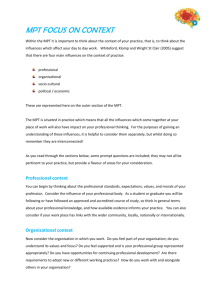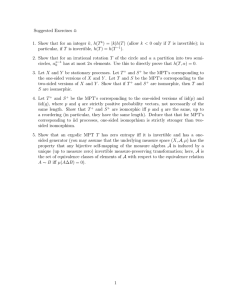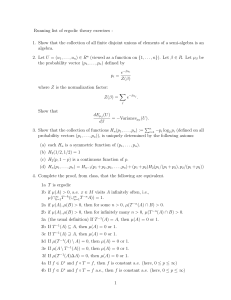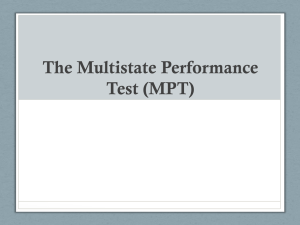U.S. DOD Form dod-opnavinst-5230-22
advertisement
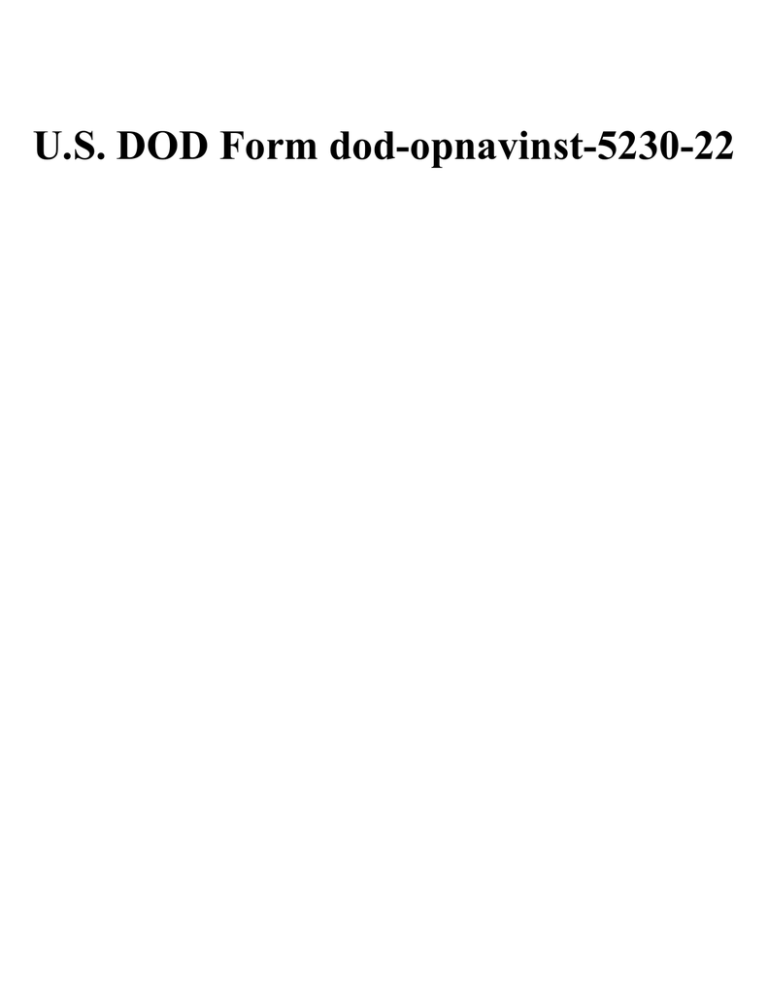
U.S. DOD Form dod-opnavinst-5230-22 . ., DEPARTMENT OFFICE OF THE WASH CHIEF OF THE OF NAVAL INGTON. D.C. NAVY OPERATIONS 20350 IN REPLY REPIER TO OPNAVINST 5230.22 OP-162 ~G OGTIW OPNAV INSTRUCTION 5230.22 From: Chief Subj : MANPOWER, PERSONNEL AND TRAIN ING ( MPT ) I NFORMATION RESOURCES ~MMAGIMENT ( I IO/I) PROGRAM Ref: (a) (b) (c) of Naval Operations SECNAVINST 5224.1 (NOTAL) COD Directive 7740.1 of 20 Jun 83 (NOTAL) Firm Temp Reg 10 CFR Chapter 201, Appendix A of 22 JAN 85 (NOTAL) (d) SECNAVNOTE 5230 Of 27 Feb 85 (NOTAL) (e) SECNAVINST 5231 .lB (NOTAL) (f) CNO (OP-01) memo Subj: OP-01 Business Plan of 6 Sep 85 (NOTAL) (g) SECNAVINST 5230.9A (NOTAL) (h) ~ Circular 130 of 12 Dec 85 (NOTAL) (i) SECNAVINST 5232.1 (NOTAL) Assigned Responsible Agent (ARA) (j) lXID memo Subj: for data standards maintenance of 8 Jul 83 (NOTAL) (k) SECNAVINST 5212.5C (NOTAL) ( 1) SECNAVINST 5214.2A (NOTAL) (m) OPNAVINST 5214.7 (NOTAL) (n) DIR DONPIC ltr ser 902 G/187640 of 27 Jul 79 (NOTAL) Enc 1: (1) (2) (3) (4) (5) (6) , . (7) (8) Definition of Terms EON IR Program Planning MPT IRM Planning Process Business Planning/IRM Overlay MPT ISM’ Policy Guidance MPT IRM Board Mission & Functions ~N kIPT IRM Program ~MPTConsumer Liaison Group 1. Purpose. To establish ties, and a framework for (hereafter referred to as 2. Cancellation. policies, strategies, meeting MPT information the MPT IRM Program). responsibili­ requirements OPNAVINST 5230.20. 3. Definitions. Terms used in this instruction are defined in enclosure (1). Familiarity with terms in enclosure (1) is essential to understanding key concepts of the LMPT IRM Program. 0589LD0540455 OPNAVINST 5230.22 06 OCT 1986 4. placability and Scope. Applicable to information, informa­ (manual and automated), tion systems and information technol­ ogy . Key effected areas include information requirements analysis, management of automated information systems, informa­ tion technology management, data elements, information collec­ privacy and security of information, statistical activi­ tion, forms , reports, and records used in support of MPT mission ties, requirements Navy-wide. 5. Authority. References (a) through (m) provide general goals and objectives for IRM. Reference (g) assigns the Deputy Chief Personnel and Training) (DCNO of Naval Operations (Manpower, (lMPT)) (OP-01) responsibility for information resources (IR) pro­ gram planning for MPT (hereafter referred to as the lMPT Enclosure (2) provides an overview of the Functional Sponsor). DON Information Resources (IR) Program Planning Process. To improve mission readiness through cost-effective 6. Goal . acquisition, management, planning, and use of information, mation systems, and information technology. 7. infor­ m proc~;s essential and IRii concept Program An overview of the MPT IRM planning Program Management. A description of the is provided in enclosure (3). relationship between MPT business goa!s and objectives Details regarding this is provided in enclosure (4). The llPT IHM will be provided in supporting documents. will be: (1) Directed ples based on mission Strategy. (2) Centrally to functional standardization respond achieve toward sound requirements (4) b. Data (1) used/reused verted into Structured centralized planning princi­ Long Range ,MPT coordinated to ensure planned initiatives to reduce redundant reporting and needs, and resource sharing. (3) Designed to assessing MPT information architectures. emphasizing implementation and the Navy respond to current and future needs require.ments based upon functional to distribute control of information resources data and conrnunications. by while Management Data Collection: by anyone who is machine readable Data will be collected once and Data is con­ authorized access. form as soon in the data flow as 2 — OPNAVINST 5230.22 06 OCT 1986 Validation checks for error identification, correc­ possible. tion, control and updating are also accomplished early in the Redundant collection will only be authorized data life cycle. for specific functions such as verification. Each item of official information (2) Data Storage: should be retained in only one place, unless multiple storage locations are specifically authorized for security, integrity, Storage should be managed in a way that privacy or efficiency. promotes sharing, availability, protection, and transportability. The purpose of control is to minimize (3) Data Control: the uncertainty that the data in data systems correctly reflect Data will be controlled through the actual events as they occur. enforcement and auditing of data standards. (4) Data Element Functional Sponsorship: All corporate The data data elements will have a designated data sponsor. sponsor is the organization having authority to define the data element, establish its legal values and authorize its use and update. This organization is also responsible for policy deci­ The data sponsor will sions which impact the data element. interpret or develop functional policies necessary to comply with MPT requirements, designate offices authorized to update or modify the values of that data and when appropriate define the range of legal values that are authorized. (5) Data Archiving/Destruction: Data will be archived or for records disposition following the requirements in reference (k). Essentially each originator deter­ current and retention (historical) requirements and the (record/information holding) conmand retains the data destroyed identified mines the processing accordingly. enforced achieve Data Standards (6) Data Standards: to improve data management, enhance a shared data environment. will be developed and data quality, and c* Information Systems and Technology (IWT) Management. IS&T represents an indispensable tool for improving mission MPT IS&T efforts will be designed to: readiness. operational use .— of (1) Ensure (2) Improve productivity, performance. (3) Encourage IS&T resources. a clear link cost-effective to MPT mission program requirements. management acquisition, and management, and OPNAVINST 5230.22 060CT 1986 (4) interruption Additional Note: 8. Continue current or degradation. MPT IRIW Program information IS&T guidance is provided with in minimal enclosure (5). Strategy Short-term a. (1) Restructure the planning grated strategic approach to achieving objectives. (2) perform Navy-wide identified responsibilities, extent permitted by available (3) policy wide support Produce guidance process to reflect MPT IRM Program Total Force in reference resources. an inte­ Functional Sponsor (g), to the maximum a MPT Functional Sponsor Plan for MPT information resources providing Navy­ (IR) support. (4) Assess and evaluate Component Information Management Plans (CIMPS) identifying h’IPT information support requirements, Completion of a Information as identified in reference (g). Requirement Plan (IRP) is part of the CIMP requirement. groups to technical (5) Convene functional, to discuss key MPT IRM issues. (6) facilitate Issue standards, MPT IRM program and operational bulletins guidelines, implementation. (7) to provide technical information Develop a MPT Information Resources a primary reference and ready access users of MPT information, information technology. work­ and memoranda Directory (IRD) to functional and systems and (8) Give primary emphasis to the achievement of MPT IR’vI Personnel and Training Information goals within the Manpower, Systems (MAPTIS) Program; and issue guidance to organizations having MPT information support responsibilities Navy-wide. outside support b. (9) the Develop an interface MAPTIS constituency. methodology (10) Encourage development of the MPT IRM Program. of prototype for !’vlPTdata projects users in Lon g-term (1) Develop a Transition environment through implementation target functional and technical Plan to achieve a shared data of subject area data bases and architectures. 4 —
